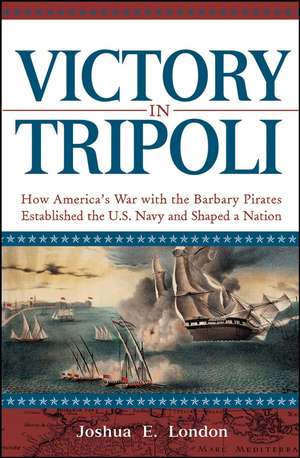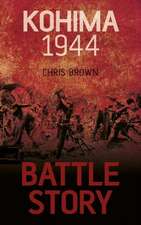Victory in Tripoli: How America's War with the Barbary Pirates Established the U.S. Navy and Shaped a Nation
Autor Joshua E. Londonen Limba Engleză Hardback – 18 aug 2005
Preț: 187.41 lei
Nou
Puncte Express: 281
Preț estimativ în valută:
35.87€ • 37.31$ • 29.61£
35.87€ • 37.31$ • 29.61£
Carte disponibilă
Livrare economică 25 martie-08 aprilie
Preluare comenzi: 021 569.72.76
Specificații
ISBN-13: 9780471444152
ISBN-10: 0471444154
Pagini: 276
Dimensiuni: 160 x 244 x 26 mm
Greutate: 0.53 kg
Editura: Wiley
Locul publicării:Hoboken, United States
ISBN-10: 0471444154
Pagini: 276
Dimensiuni: 160 x 244 x 26 mm
Greutate: 0.53 kg
Editura: Wiley
Locul publicării:Hoboken, United States
Public țintă
History and military history readers as well as those interested in the parallels between this war and our current war on terrorismDescriere
"This is a tale of piracy, heroism, disaster, triumph, and American exceptionalism. A wonderful story, filling a gap in the history of the early republic. A terrific book!"
Bernard Cornwell, New York Times bestselling author of Sharpe′s Havoc "Insightful and entertaining, Victory in Tripoli is an absolutely fascinating story, wonderfully told. Anyone with even a passing interest in naval history, or U.S. history in general, should read this book."
Admiral William J. Crowe Jr., USN (Ret.), former chairman of the Joint Chiefs of Staff
"Victory in Tripoli deftly captures the dangers of covert operations, the complexity of international diplomacy, and the thrills and horrors of battle. Joshua E. London′s exciting and insightful look at one of America′s earliest and seldom remembered foreign escapades offers much for the keen observer of current events."
Charles T. Pinck, president of the Office of Strategic Services (OSS) Society
"History shall tell that the United States first volunteered a ship of war, equipped, a carrier for a pirate. . . . Frankly I own, I would have lost the peace and been impaled myself rather than yield such a concession. Will nothing rouse my country!"
William Eaton, in a letter to the secretary of state, 1800
Giving money, arms, and a warship to a pirate who has attacked our merchant vessels and taken U.S. sailors as slaves? William Eaton, United States consul to Tunis, was furious. Eaton, however, was not a man given to impotent rage. He was intent on ending the custom of paying protection money to the Barbary pirates of Algiers, Tunis, and Tripoli. His plan: to reverse the roles of diplomacy in the region by taking the fight straight to the piratical regimes.
Over the next five years, the fledgling U.S. Navy would develop into a formidable force as it employed blockades, covert operations, amphibious assaults, brute force, and even mercenaries to make the Mediterranean safe for U.S. merchant ships. Victory in Tripoli tells the inspiring story of how Eaton and a few other determined Americans forced their young nation to stand up to terrorism. It is an eerily familiar tale whose lessons remain central to U.S. foreign policy to this day.
Bernard Cornwell, New York Times bestselling author of Sharpe′s Havoc "Insightful and entertaining, Victory in Tripoli is an absolutely fascinating story, wonderfully told. Anyone with even a passing interest in naval history, or U.S. history in general, should read this book."
Admiral William J. Crowe Jr., USN (Ret.), former chairman of the Joint Chiefs of Staff
"Victory in Tripoli deftly captures the dangers of covert operations, the complexity of international diplomacy, and the thrills and horrors of battle. Joshua E. London′s exciting and insightful look at one of America′s earliest and seldom remembered foreign escapades offers much for the keen observer of current events."
Charles T. Pinck, president of the Office of Strategic Services (OSS) Society
"History shall tell that the United States first volunteered a ship of war, equipped, a carrier for a pirate. . . . Frankly I own, I would have lost the peace and been impaled myself rather than yield such a concession. Will nothing rouse my country!"
William Eaton, in a letter to the secretary of state, 1800
Giving money, arms, and a warship to a pirate who has attacked our merchant vessels and taken U.S. sailors as slaves? William Eaton, United States consul to Tunis, was furious. Eaton, however, was not a man given to impotent rage. He was intent on ending the custom of paying protection money to the Barbary pirates of Algiers, Tunis, and Tripoli. His plan: to reverse the roles of diplomacy in the region by taking the fight straight to the piratical regimes.
Over the next five years, the fledgling U.S. Navy would develop into a formidable force as it employed blockades, covert operations, amphibious assaults, brute force, and even mercenaries to make the Mediterranean safe for U.S. merchant ships. Victory in Tripoli tells the inspiring story of how Eaton and a few other determined Americans forced their young nation to stand up to terrorism. It is an eerily familiar tale whose lessons remain central to U.S. foreign policy to this day.
Textul de pe ultima copertă
"This is a tale of piracy, heroism, disaster, triumph, and American exceptionalism. A wonderful story, filling a gap in the history of the early republic. A terrific book!"
Bernard Cornwell, New York Times bestselling author of Sharpe′s Havoc "Insightful and entertaining, Victory in Tripoli is an absolutely fascinating story, wonderfully told. Anyone with even a passing interest in naval history, or U.S. history in general, should read this book."
Admiral William J. Crowe Jr., USN (Ret.), former chairman of the Joint Chiefs of Staff
"Victory in Tripoli deftly captures the dangers of covert operations, the complexity of international diplomacy, and the thrills and horrors of battle. Joshua E. London′s exciting and insightful look at one of America′s earliest and seldom remembered foreign escapades offers much for the keen observer of current events."
Charles T. Pinck, president of the Office of Strategic Services (OSS) Society
"History shall tell that the United States first volunteered a ship of war, equipped, a carrier for a pirate. . . . Frankly I own, I would have lost the peace and been impaled myself rather than yield such a concession. Will nothing rouse my country!"
William Eaton, in a letter to the secretary of state, 1800
Giving money, arms, and a warship to a pirate who has attacked our merchant vessels and taken U.S. sailors as slaves? William Eaton, United States consul to Tunis, was furious. Eaton, however, was not a man given to impotent rage. He was intent on ending the custom of paying protection money to the Barbary pirates of Algiers, Tunis, and Tripoli. His plan: to reverse the roles of diplomacy in the region by taking the fight straight to the piratical regimes.
Over the next five years, the fledgling U.S. Navy would develop into a formidable force as it employed blockades, covert operations, amphibious assaults, brute force, and even mercenaries to make the Mediterranean safe for U.S. merchant ships. Victory in Tripoli tells the inspiring story of how Eaton and a few other determined Americans forced their young nation to stand up to terrorism. It is an eerily familiar tale whose lessons remain central to U.S. foreign policy to this day.
Bernard Cornwell, New York Times bestselling author of Sharpe′s Havoc "Insightful and entertaining, Victory in Tripoli is an absolutely fascinating story, wonderfully told. Anyone with even a passing interest in naval history, or U.S. history in general, should read this book."
Admiral William J. Crowe Jr., USN (Ret.), former chairman of the Joint Chiefs of Staff
"Victory in Tripoli deftly captures the dangers of covert operations, the complexity of international diplomacy, and the thrills and horrors of battle. Joshua E. London′s exciting and insightful look at one of America′s earliest and seldom remembered foreign escapades offers much for the keen observer of current events."
Charles T. Pinck, president of the Office of Strategic Services (OSS) Society
"History shall tell that the United States first volunteered a ship of war, equipped, a carrier for a pirate. . . . Frankly I own, I would have lost the peace and been impaled myself rather than yield such a concession. Will nothing rouse my country!"
William Eaton, in a letter to the secretary of state, 1800
Giving money, arms, and a warship to a pirate who has attacked our merchant vessels and taken U.S. sailors as slaves? William Eaton, United States consul to Tunis, was furious. Eaton, however, was not a man given to impotent rage. He was intent on ending the custom of paying protection money to the Barbary pirates of Algiers, Tunis, and Tripoli. His plan: to reverse the roles of diplomacy in the region by taking the fight straight to the piratical regimes.
Over the next five years, the fledgling U.S. Navy would develop into a formidable force as it employed blockades, covert operations, amphibious assaults, brute force, and even mercenaries to make the Mediterranean safe for U.S. merchant ships. Victory in Tripoli tells the inspiring story of how Eaton and a few other determined Americans forced their young nation to stand up to terrorism. It is an eerily familiar tale whose lessons remain central to U.S. foreign policy to this day.
Cuprins
Acknowledgments. Introduction: ′Will Nothing Rouse My Country!"
1. Barbary Piracy.
2. Ensnared in Barbary.
3. Eaton Enters Barbary.
4. The Trials and Tribulations of a U.S. Consul.
5. American Declares War.
6. American Might, Frustrated.
7. Slouching toward Failure.
8. The Philadelphia Disaster.
9. American Gunboat Diplomacy.
10. General Eaton′s Advance.
11. To the Shores of Tripoli.
12. American Peace.
13. The Lessons of War.
Bibliography.
Photo Credits.
Index.
1. Barbary Piracy.
2. Ensnared in Barbary.
3. Eaton Enters Barbary.
4. The Trials and Tribulations of a U.S. Consul.
5. American Declares War.
6. American Might, Frustrated.
7. Slouching toward Failure.
8. The Philadelphia Disaster.
9. American Gunboat Diplomacy.
10. General Eaton′s Advance.
11. To the Shores of Tripoli.
12. American Peace.
13. The Lessons of War.
Bibliography.
Photo Credits.
Index.
Notă biografică
JOSHUA E. LONDON is a Washington, D.C.–based writer. He has written on politics and public policy for many publications, including the American Spectator, Human Events, National Review Online, and Details: Promoting Jewish Conservative Values. London holds an M.A. in social science from the University of Chicago and a B.A. in political science from the University of California, Davis.










